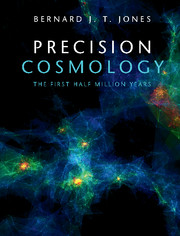Book contents
- Frontmatter
- Dedication
- Contents
- Preface
- Notation and Conventions
- Part I 100 Years of Cosmology
- 1 Emerging Cosmology
- 2 The Cosmic Expansion
- 3 The Cosmic Microwave Background
- 4 Recent Cosmology
- Part II Newtonian Cosmology
- Part III Relativistic Cosmology
- Part IV The Physics of Matter and Radiation
- Part V Precision Tools for Precision Cosmology
- Appendix A SI, CGS and Planck Units
- Appendix B Magnitudes and Distances
- Appendix C Representing Vectors and Tensors
- Appendix D The Electromagnetic Field
- Appendix E Statistical Distributions
- Appendix F Functions on a Sphere
- Appendix G Acknowledgements
- References
- Index
1 - Emerging Cosmology
from Part I - 100 Years of Cosmology
Published online by Cambridge University Press: 04 May 2017
- Frontmatter
- Dedication
- Contents
- Preface
- Notation and Conventions
- Part I 100 Years of Cosmology
- 1 Emerging Cosmology
- 2 The Cosmic Expansion
- 3 The Cosmic Microwave Background
- 4 Recent Cosmology
- Part II Newtonian Cosmology
- Part III Relativistic Cosmology
- Part IV The Physics of Matter and Radiation
- Part V Precision Tools for Precision Cosmology
- Appendix A SI, CGS and Planck Units
- Appendix B Magnitudes and Distances
- Appendix C Representing Vectors and Tensors
- Appendix D The Electromagnetic Field
- Appendix E Statistical Distributions
- Appendix F Functions on a Sphere
- Appendix G Acknowledgements
- References
- Index
Summary
The Universe is as it is because it was as it was
Herman Bondi,
Lectures at King's College London, 1965
Introduction
Almost every civilisation throughout history has had a cosmology of some kind. By this we mean a description of the Universe in which they live based on their state of knowledge. The Vikings, for example, had a complex cosmology in which the world and its inhabitants were controlled by a set of Gods, both good and bad. Nature was ruled not by the laws of physics, but by the forces of nature controlled by the whims of these Gods. However bizarre that may seem to us now, at the time this belief-set dominated human behaviour: its social mores and values.
Today we live in a Universe that is described by physical laws. What is remarkable is that these laws have more often than not been discovered on the basis of laboratory experiments, and subsequently found to work on the vastest scales imaginable. That fact leads us to believe that our explanations of the Universe are a valid description of what is actually happening. We do not need to invoke special laws just to explain the cosmos and our position within it.
The physical laws governing the Universe and its constituents were discovered over a period of several centuries. Some might say this path to realisation started with Copernicus putting the Sun at the centre of everything rather than the Earth. Others might argue that this was merely descriptive and that knowledge of the laws started to emerge following on from the work of Kepler, Galileo and Newton. However one sees it, by the beginning of the 20th century, with Einstein's Theory of Relativity, the scene was set to embark on a journey of observational cosmology which 100 years later would lead to most scientists agreeing that we have a self-consistent theory of the Universe based on known laws of physics. Some, no doubt, would go as far as to say that the current view was incontrovertible.
Just as the early map makers measured and marked out our planet, the cosmographers of the 20th century marked out and mapped the Universe.
Information
- Type
- Chapter
- Information
- Precision CosmologyThe First Half Million Years, pp. 3 - 18Publisher: Cambridge University PressPrint publication year: 2017
